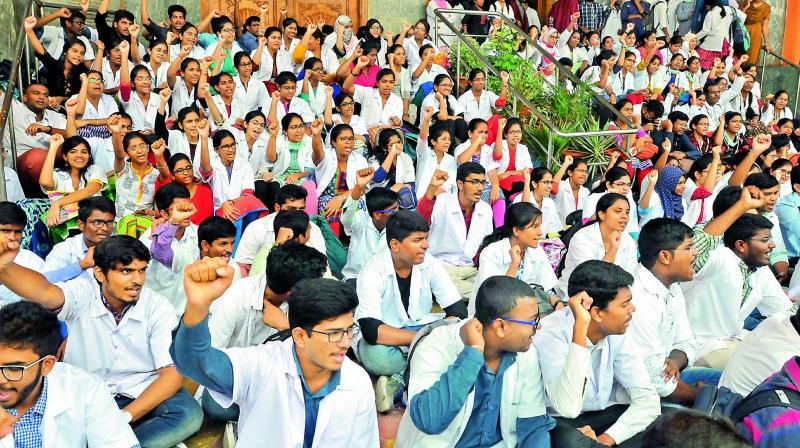Protect the doctors
The increasing attacks on doctors by the public, especially in government hospitals, has become a worrying trend.

When 75-year-old Mohammad Shaheed died earlier this month while undergoing treatment at the NRS Medical College Hospital in West Bengal, his relatives alleging medical negligence, manhandled the junior doctors. This led to a countrywide protest by doctors.
This is not an isolated case. Doctors are increasingly being attacked by the mob when a patient dies, blaming the doctors for negligence.
Doctors in government hospitals face the brunt of criticism despite doing their best and being committed to their profession. They are well qualified, their skills are exemplary; especially when you look at the number of patients they attend to on any single day. They are extremely overworked. Nobody seems to understand that.
Dr Nageshwar Reddy, chairman, Asian Institute of Gastroenterology at Hyderabad, and a world renowned doctor himself, talks very highly of government doctors. He says, “Not just the doctors, even the support staff in government hospitals is doing tremendous work. Patients, relatives and government should understand how stressful their job can be. Medical staff is extremely overworked and paying attention to each patient at times takes a backseat. Doctors are overworked, underpaid, working their best in poor conditions and infrastructure. Forget about credit, they don’t even get their dues. Predominantly, India is dependent on the government hospitals compared to the West.”
Doctors are so overworked
The shortage of medical personnel is a basic problem in the health sector. On an average, a government doctor attends to 11,082 people, more than 10 times than what the WHO recommends. What most laymen do not care to understand is that unlike most corporate hospitals, government hospitals are usually understaffed and their doctors and personnel — who are on par with those in the corporate hospitals — mostly overworked, with 48-hour shifts! Says Dr K. Hari Prasad, CEO Apollo Health City, “They are doing a fantastic job given the bad infrastructure and staff shortage. They are overworked and overextended and they have little time to take on more patients. Society needs to understand their contribution and respect them.”
Better infrastructure needed
Talking of the recent attacks in Bihar, where it was claimed that two-three patients had to share one bed in a government hospital, Dr Pandu Naik, JAC member from Osmania General Hospital, says, “It’s the responsibility of the government to provide the infrastructure and medicines. Instead of public screaming if a patient couldn’t be saved by a government doctor, maybe it’s time for them to ask the government beds and life-saving equipment in those hospitals.”
Dr Chinta Ramesh, ex-president, Telanagana State Government Doctors Association, agrees with Pandu. “Doctors in government hospitals try to accommodate as many patients as they can, but they cannot provide beds or infrastructure. That’s the government’s job. Many such hospitals have a less number of doctors, supportive staff and materials, and one doctor ends up looking after hundreds of patients. It’s an enormous task for anyone, but in most cases, you’ll find doctors attending to everything and giving their best,” says Dr Chinta Ramesh. Dr Harinath, doing his PG at Gandhi Hospital in the city, attends to nearly 100 patients at the paediatric general ward between 9 am and 12 pm. “Then I’m in the wards looking after the patients and continue till midnight. The cycle repeats the next day. I am working on three hours of sleep on most days,” says Harinath.
Politicians add to the mess
On many occasions some of the political parties, mainly from the Opposition, target the doctors in district and village level hospitals. “These parties are not against the doctors, but to gain public sympathy, they’d support a dead patient’s relatives in attacking the doctors. Political parties should not encourage this kind of actions against doctors,” says Dr Chinta Ramesh, pointing out the trend that’s been happening in many places across India. What worsens the situation is that the government does not even provide security at government hospitals. In contrast, a corporate hospital has its own security, counselling and even PR managers.
The hospital staff also take out time in the beginning to explain the costs to the patient. And all of these services come at a high cost! Despite the services they get in the private hospitals and after spending lakhs of rupees, there are some cases referred to government hospitals as a last recourse. “Relatives know it is the last stage of the patient, but doctors can’t reject them. If the patient responds for the treatment, he survives, but if he doesn’t and dies, relatives blame the doctors! Something they can’t do in a private hospital,” adds Dr Pandu Naik disgruntledly.

